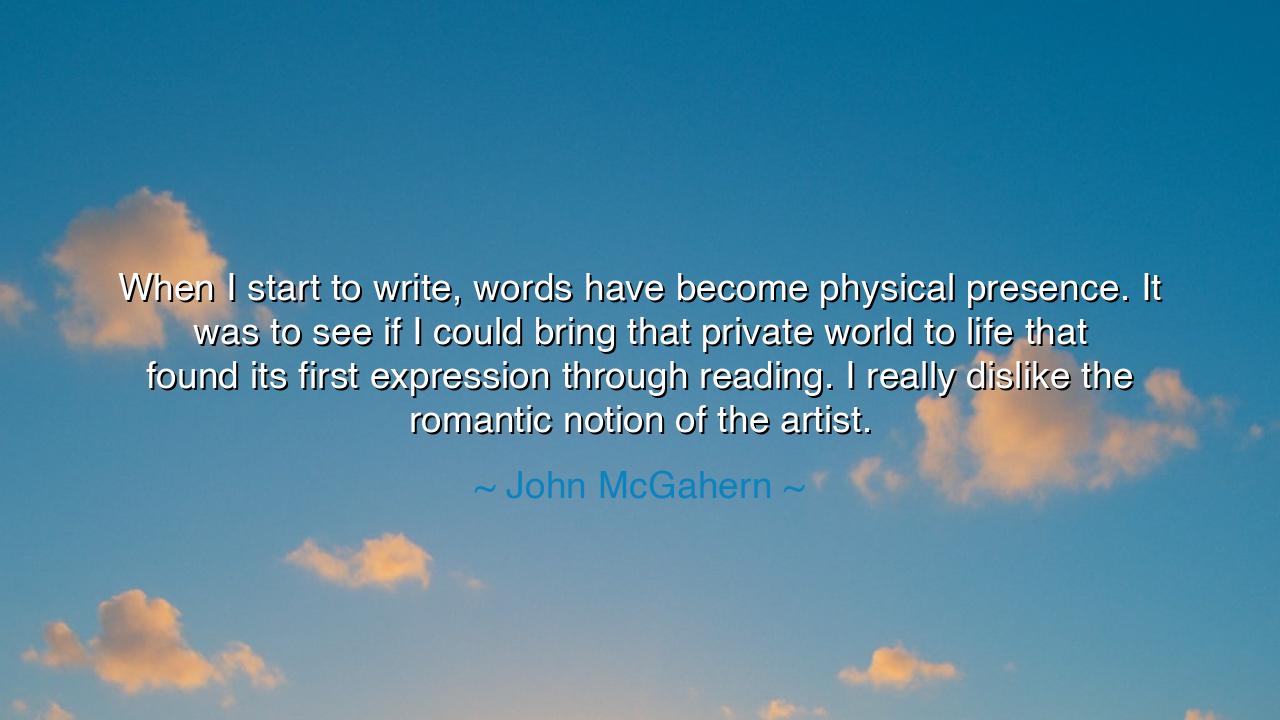
When I start to write, words have become physical presence. It
When I start to write, words have become physical presence. It was to see if I could bring that private world to life that found its first expression through reading. I really dislike the romantic notion of the artist.






Hear now the words of John McGahern, who speaks with clarity and introspection about the nature of writing and the creative process: "When I start to write, words have become physical presence. It was to see if I could bring that private world to life that found its first expression through reading. I really dislike the romantic notion of the artist." In these words, McGahern offers a profound reflection on the relationship between the writer and the world they create. Words, for McGahern, are not mere symbols or abstract ideas; they are physical entities, imbued with the power to create, shape, and bring to life the inner world of the author. This is not an act of self-indulgence or a romantic ideal of artistic genius, but a deliberate and disciplined craft—a pursuit of expression that seeks to give form to what is intangible, to make the private world of the writer known to others.
In the ancient world, the power of the word was seen as sacred—the very foundation of creation itself. The Greek philosophers and poets believed that language was not only a tool for communication but a force that shaped reality. Homer’s epic Iliad and Odyssey are prime examples of how words can shape the imaginations and minds of those who encounter them. The words in these works are not passive; they are active forces, carrying the weight of history, culture, and emotion. Similarly, the words of the ancient prophets were seen as divine, not simply because they conveyed information, but because they had the power to transform lives and direct fates. McGahern’s understanding of writing echoes this ancient view—words, in his hands, become more than just symbols; they become living entities that exist beyond the page.
What McGahern rejects, however, is the romantic notion of the artist—the idea that creation is born of inspiration alone, that the writer is some unreachable genius whose work flows effortlessly from the mind to the page. This notion, so often romanticized in the tales of creative geniuses throughout history, suggests that art is a gift from the gods, a divine spark that requires little effort. But for McGahern, the process of creation is not a mystical act, but one of discipline and hard work. The artist, in his view, is not some untouchable figure working in isolation, but a craftsman—one who labors to bring the private world into the open, to render the unseen into the visible. In rejecting the romantic myth of the artist, McGahern places the writer back into the realm of the ordinary, emphasizing that the act of creation is grounded in the same effort, persistence, and physicality as any other labor.
Think of the great ancient builders, like the Egyptians who constructed the pyramids or the Romans who crafted aqueducts. These were not acts of divine inspiration, but of meticulous craftsmanship—the result of careful planning, effort, and dedication. Just as these builders labored to bring their visions into reality, so too does McGahern view the act of writing. It is not about waiting for inspiration to strike, but about discipline and the physical labor of putting words together, of crafting a world from nothing. This view is reflected in the writings of the Roman historian Pliny the Elder, who understood the importance of hard work and methodical effort in all things, including the creation of knowledge. In the same way, McGahern’s craft is not about waiting for muse to intervene, but about actively shaping words into something that breathes.
In this, McGahern’s words are a call to those who seek to create, whether in writing, art, or any other form of expression. The true artist is not defined by romanticized notions of divine inspiration, but by their ability to take the raw materials of life—thoughts, experiences, and emotions—and, through sheer will and effort, give them form. The lesson here is that creation is not merely a gift from the gods, but a labor of love, a craft that demands both patience and dedication. To bring something into being, to breathe life into an idea, is not an act of mere inspiration, but one of persistence and skill.
And so, O seekers, let this wisdom guide you in your own pursuits. Whether you write, paint, build, or create in any form, remember that the process of bringing something into existence requires effort—not simply waiting for divine moments of inspiration, but actively engaging with your craft, shaping it with the same dedication as a master builder. As McGahern teaches, it is through this hard work that your private world—your innermost thoughts, dreams, and experiences—can be manifested into something tangible, something that others can see, touch, and experience. Allow your creative journey to be one of both labor and expression, where each word, each stroke, and each act of creation is a step toward bringing your inner vision to life.
Thus, O wise ones, embrace the discipline of creation, knowing that it is through effort and dedication that the private world of the artist becomes something tangible. Reject the notion that art is born solely of inspiration and accept that the true craft of creation lies in the willingness to work, to persist, and to turn your thoughts into physical presence. Whether you are a writer, a painter, or a maker of any kind, take pride in the labor of bringing something into being, knowing that in doing so, you are participating in the age-old tradition of creation—a tradition not of divine whim, but of human effort and spirit.






AAdministratorAdministrator
Welcome, honored guests. Please leave a comment, we will respond soon